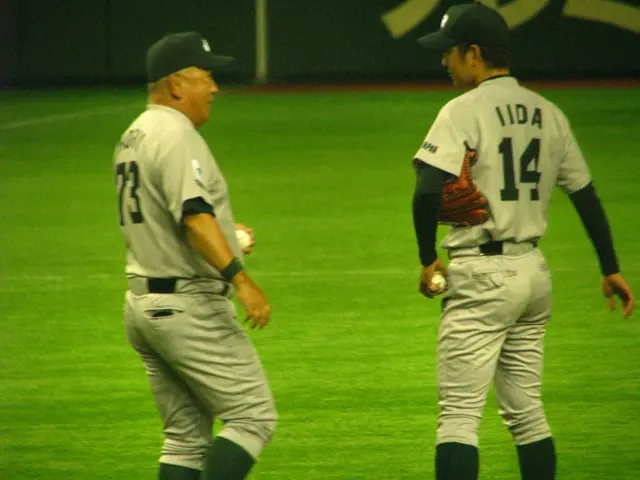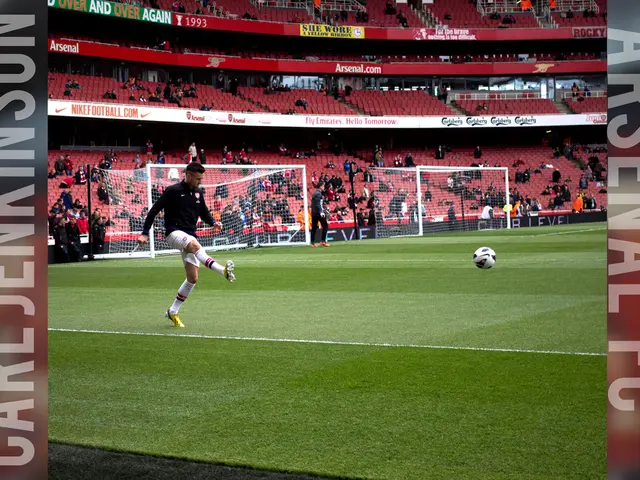Bouncing from the UFC? Groundbreaking Lawsuits Shatter MMA's Norm
Dispute Turbulences UFC Business Structure Amid Legal Action
By Mike Boomer
Shares: 48 Comments: 12 Reply Email Tweet Print
In the brutal world of MMA, fighters aren't exactly handed employment contracts. Instead, they're dubbed independent contractors - a classification that leaves them bound by the restrictive grips of event promoters. But two shocking lawsuits might just yank the UFC's business model out by the roots.
For years, the UFC's handling of fighter salaries has stirred up grumbles in the MMA industry, with many grapplers complaining about feeling undersold and abused by the UFC's aggressive dominance in the market. This frustration has already produced a class-action lawsuit that, after a grueling decade, settled at a jaw-dropping $375 million. But two more lawsuits are now rattling the UFC's cage, and they could cause seismic shifts throughout the sport.
Under the UFC's current arrangement, fighters don't sign employment contracts like they would for, say, the NFL. Instead, they agree to terms as exclusive service providers. They're then bound by a contract length and the number of guaranteed fights determined by the UFC. An average fighter would clock in one fight every six months due to injury concerns, but various clauses can extend the contract term for declined fights, injuries, or championship wins. With such a labyrinthine contract web, it's usually the athletes who come up short.
MMA on Prime Time… ...strikes back on June 14 with OKTAGON 72 on RTL.
The last legal spat between several former UFC fighters and Zuffa LLC, UFC's parent company, stretched on for what seemed like an eternity. Despite the UFC's desire to settle the dispute out of court, the judge vetoed it, arguing that the proposed compensation was too paltry and that problematic clauses in UFC contracts were preventing more fighters from joining the lawsuit. Adding insult to injury, the judge also took issue with the UFC's failure to address its alleged monopoly position in the MMA market.
Now, the first of the two new lawsuits zeroes in on these very concerns voiced by the judge. In essence, it seeks to compensate fighters who are unable to join lawsuits due to restrictive contract clauses, a move that could dramatically expand the pool of potential litigants. With the amount claimed surpassing hundreds of millions, this suit could send shockwaves throughout the sport.
The second lawsuit leveled against the UFC at the end of May is something of a wild card. It's led by Phil Davis, a former UFC fighter who isn't seeking damages himself. Instead, he's aiming to prove that the UFC's monopoly puts a squeeze on fighter pay in rival organizations. Davis contends that the UFC's contract system is keeping top-flight MMA event promotions like the Professional Fighters League (PFL) from acquiring first-rate talent.
With Davis ranked eighth in the organization-wide lightweight rankings, he finds himself in prime position for some lucrative fights - yet the UFC's long-term contracts thwart his progress. This self-proclaimed kingmaker is taking the UFC's contractual practices to task, specifically the controversial practice of locking top fighters down for extended periods. He champions the inclusion of a "sunset clause" - essentially an automatic termination option that would conclude obligations after a pre-determined timeframe. For a fleet moment following the first UFC antitrust lawsuit in 2014, the UFC incorporated such a clause into its contracts, only to scrap it later after fighters like Francis Ngannou exploited it to score big-money deals outside the UFC while still under contract.
Davis is now rallying for a one-year "sunset clause," a move that could set off a domino effect across the MMA landscape. If the UFC were to adopt this change, a slew of other fighters could potentially exit their contracts within months to negotiate better deals elsewhere. Although this would ensure market-based wages, it would also leave large organizations with little contract security. In turn, this might force other organizations to enact their own sunset clauses, resulting in astonishingly high turnover rates. Dissatisfied fighters may simply sit out their contracts without becoming active, thereby reducing the number of identifiable figures in organizations. Ultimately, the UFC might bear the brunt of the financial impact, as many of its stars get lured away by greener pastures.
The odds of success for both lawsuits remains uncertain, but given lingering judicial doubts about the UFC's monopoly, it's safe to expect legal struggles ahead.
Source: ntv.de
- Mixed Martial Arts
- Ultimate Fighting Championship
Insights:
- Impact on Competition: If the UFC's dominance is curbed, rival promotions could attract top-tier talent, leading to increased competition[1][3].
- Contract Flexibility: Changes in contract practices could result in shorter, more favorable agreements for fighters across the industry[1][4].
- Fairer Compensation: If contracts become more flexible, fighter pay and benefits could improve[2][3].
- Employment Status: Lawsuits could challenge the independent contractor classification of fighters, potentially redefining their status and benefits[5].
- Increased Mobility: Flexible contracts could give fighters greater freedom to switch promotions, boosting their career prospects[4].
- Transparency and Rights: Structural changes could lead to increased transparency and improved rights for fighters, enhancing their overall wellbeing[4][5].
- Business Model Implications for the UFC: financial impact, reputation, and legal challenges could alter the UFC's strategy and operations[1][3].
- Theimportance of the lawsuits against the Ultimate Fighting Championship (UFC) in the sports industry, particularly Mixed Martial Arts (MMA), could lead to a more balanced competition landscape, as top-tier MMA fighters might be more easily attracted to rival promotions.
- The legal implications of these lawsuits could potentially redefine the employment status of MMA fighters from independent contractors to employees, which could result in improved contracts, fairer compensation, and increased mobility across various promotions.







